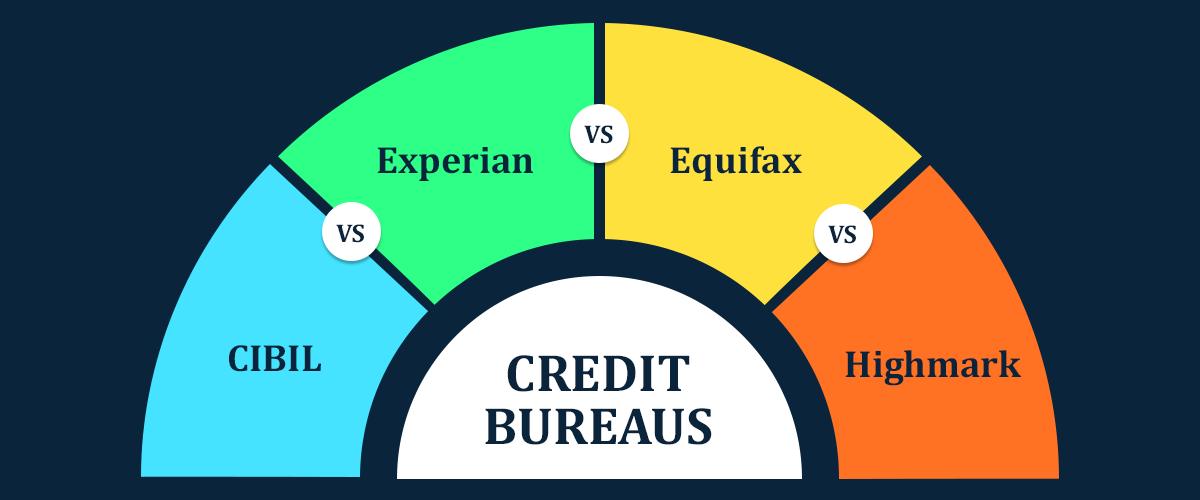There are four major credit bureaus operating in India: CIBIL, Experian, Equifax, and CRIF High Mark. In India, CICs, or credit bureaus, are specialized financial institutions licensed by the Reserve Bank of India to collect and maintain credit information about individuals and businesses. In response to this data collection, these firms generate credit scores and credit reports for individual borrowers across a variety of lending institutions. There are four credit bureaus or credit information companies in India:
- TransUnion CIBIL
- Equifax
- Experian
- CRIF High Mark
The following is a brief comparison between them:
1. CIBIL (Credit Information Bureau India Limited):
The oldest and most popular credit bureau in India is CIBIL, which provides credit reports to individuals and businesses. The TransUnion CIBIL credit bureau was established in 2000 and is one of the most popular in India. A large number of banks, financial institutions, housing finance companies, and nonbank financial companies in India are members of CIBIL. There are more than 1000 million individuals and businesses that rely on it to collect and maintain credit information. The Consumer Bureau, Commercial Bureau, and Micro Finance Institution Bureau generate CIBIL Credit Information Reports, while the Commercial Bureau generates CIBIL Commercial Reports. TransUnion’s subsidiary CIBIL is a division of the company. The cost of a credit report with a credit score is Rs. 550. There is only one charge (including taxes/handling charges) for the Credit Report.
2. Experian Credit Information Company:
Experian, a global credit bureau, entered the Indian market in 2010, becoming the first credit bureau to receive a license under the new Credit Information Companies (Regulation) Act (CICRA) 2005. More than 350 million individuals and 27 million businesses have their credit information collected and maintained by it in India. In general, a higher score signifies a better credit profile. Experian scores range from 300 to 900.
Experian India offers both individuals and companies access to Experian credit reports and scores. To help individuals and businesses make informed credit decisions, it provides information, marketing services, and analytical tools. It costs Rs. 399 (including taxes) for a Credit Report and Credit Score. The cost of the Credit Report alone is Rs. 138.
3. Equifax Credit Information Services:
As a global credit bureau with its headquarters in Mumbai, Equifax India is a joint venture between Equifax Inc., USA, and seven leading financial institutions in India. Using Credit Information Reports and Credit Scores, it presents credit information pertaining to individuals and commercial entities in a more useful and readable format. In addition, Equifax has a separate bureau for Microfinance Institutions, whose needs are increased as a result of increased lending and regulatory requirements. There are over 600 million individuals and 26 million businesses in India who are provided with credit information through this company. Generally, Equifax’s score ranges from 1 to 999, with a higher score indicating better credit. A credit report with a credit score costs Rs. 472 and a credit report without a credit score costs Rs. 118.
4. CRIF High Mark Credit Information Services:
With headquarters in Mumbai, CRIF High Mark claims to be India’s first full-service credit bureau, providing comprehensive credit information to all segments of the Indian economy, including retail consumers, small and medium businesses, commercial borrowers, and microfinance borrowers. Additionally, this credit bureau provides analytics, insights, data management, and related software solutions to banks, MFIs, NBFCs, housing finance companies, insurance companies, and telecom service providers. There is a charge of Rs. 399 for one Credit Report with a credit score.
The credit information provided by the four credit bureaus is similar, but the credit score ranges and other factors may differ slightly. Ensure that your credit report and score are accurate and up-to-date by checking them periodically from all the major credit bureaus.
CIBIL, Experian, Equifax, and CRIF High Mark are compared in the following table:
| Coverage | Credit Score Range | Credit Report Format | Credit Report Update Frequency | Products and Services | Customer Service | |
| CIBIL | 600 million individuals | 300-900 | Similar to others | Once a month | CIBIL Rank, Score, Dispute Resolution For Members: Customer Acquisition, Portfolio Management, Analytics, and Consulting, etc. | Good |
| Experian | 350 million individuals | 300-900 | Similar to others | Real-time | Fraud Detection, Customer Management Systems, For members: Fraud and Risk Management, etc. | Average |
| Equifax | 600 million individuals | 1-999 | Similar to others | Real-time | Credit Alert, Score Credit Report Dispute Resolution For Members: Equifax Risk Score, Equifax Portfolio Review, Equifax Alerts, etc. | Average |
| CRIF High Mark | 400 million individuals | 300-900 | Similar to others | Real-time | Credit Score, ReportDispute Resolution For Members:Identification and Anti-Fraud services, Predictive Analytics & Scorecards Additional Solutions:Business Rules and Decision Management, External Data Connector, De-Duplication Services | Good |
Please note that the information in the table is subject to change, and this is only a general overview. Specific details will vary by credit bureau and will depend on the particular products and services they offer.
FAQs
Q: How do credit bureaus determine credit scores?
A: A credit score ranges from 300 to 900 with CIBIL, Experian, and CRIF High Mark, while a credit score ranges from 1 to 999 with Equifax.
Q: How often are credit reports updated by each credit bureau?
A: Credit reports are updated once a month by CIBIL, while they are updated in real-time by Experian, Equifax, and CRIF High Mark.
Q: Does each credit bureau offer the same products and services?
A: The products and services offered by each credit bureau vary. The CIBIL Rank, for example, is a numerical representation of a company’s creditworthiness based on its credit history. In addition to monitoring credit applications, Experian offers a Fraud Detection Service that alerts individuals and businesses when suspicious activity is detected. Equifax offers a Credit Alert service, which notifies customers when their credit report changes significantly. Credit Scores and Credit Reports are available from CRIF High Mark.
Q: Which credit bureau offers the best customer service?
A: There may be differences in customer service levels between credit bureaus, with some providing better service than others. The customer service provided by each credit bureau may differ depending on individual experiences.




